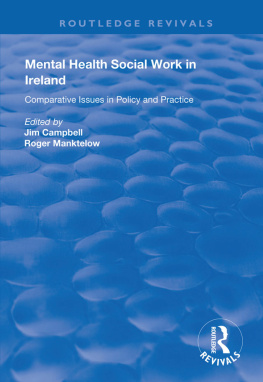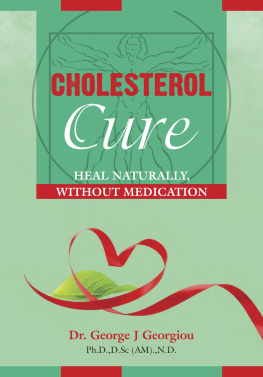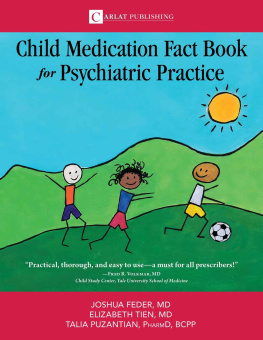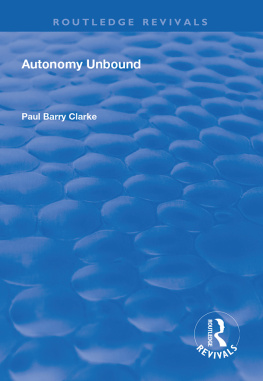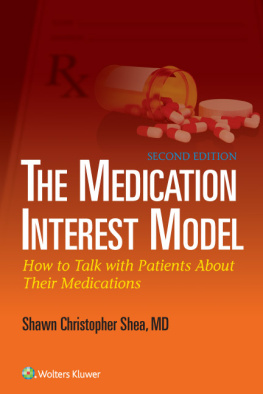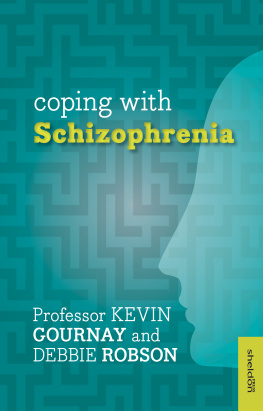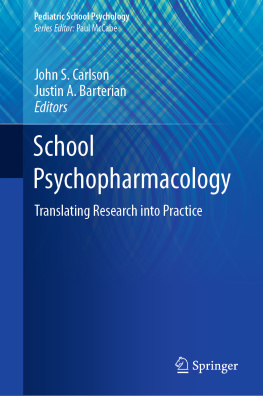
An outstanding book. A sophisticated ethnographic inquiry on how self-medication actually takes place in peoples lives, and an innovative, engaging anthropological reflection on what autonomy means in relation to the act of self-managing ones body and illness. The contemporary relevance of this researchs insights extends well beyond the issue of self-medication.
Manuela Ivone Cunha, Center for Research in Anthropology (CRIA-UMinho), Portugal
Self-Medication and Society offers an illuminating delineation of stakeholder positions in the public debate about self-medication. It provides an incisive analysis of the logics and practices of users and a thoughtful consideration of autonomy and responsibility as these terms are deployed in the current move towards recognizing and endorsing self-medication.
Susan Reynolds Whyte, University of Copenhagen, Denmark
As revealed by patients experiences beyond the medical gaze or outside medical authority, Fainzangs thorough analysis of self-medication conveys deep insights into the doctor-patient relationship. Her rich ethnography highlights medications as socially and culturally anchored, in Western societies where the valorisation of autonomy takes center stage.
Johanne Collin, University of Montreal, Canada
Self-Medication and Society
The question of recourse to self-medication arises at the intersection of two partly antagonistic discourses: that of the public authorities, who advocate the practice primarily for economic reasons, and that of health professionals, who condemn it for fear that it may pose a danger to health and dispossess the profession of expertise. This book examines the reality of self-medication in context and investigates the social treatment of the notion of autonomy ever present in the discourses promoting this practice.
Drawing on fieldwork conducted in France, the author examines the material, cognitive, symbolic and social dimensions of the recourse to self-medication, considering the motivations and practices of the subjects and what these reveal about their relationship with the medical institution, while addressing the question of open access to medicines a subject of heated debate between the actors concerned on themes such as competence, knowledge and responsibility.
A rigorous analysis of the strategies adopted by individuals to manage the risks of medicines and increase their efficacy, Self-Medication and Society will appeal to sociologists and anthropologists with interests in health, illness, the body and medicine.
Sylvie Fainzang is a French medical anthropologist and Director of Research in the INSERM (Cermes3). She is the scientific coordinator of the international network MAAH (Medical Anthropology At Home), the editor-in-chief of the international Journal Anthropologie & Sant, and the author of several books on illness and medicines.
Routledge Studies in the Sociology of Health and Illness
Available titles include:
1 Complaints, Controversies and Grievances in Medicine
Edited by Jonathan Reinarz and Rebecca Wynter
2 The Public Shaping of Medical Research
Patient associations, health movements and biomedicine
Edited by Peter Wehling and Willy Viehver
3 Giving Blood
The institutional making of altruism
Edited by Johanne Charbonneau and Andr Smith
4 Health, Food and Social Inequality
Critical perspectives on the supply and marketing of food
Carolyn Mahoney
5 Gendered Violence, Abuse and Mental in Everyday Lives
Beyond trauma
Nicole Moulding
6 Bodily Exchanges, Bioethics and Border Crossing
Perspectives on giving, selling and sharing bodies
Edited by Erik Malmqvist and Kristin Zeiler
7 Institutionalizing Assisted Reproductive Technologies
The role of science, professionalism and regulatory control
Alexander Styhre and Rebecka Arman
8 Assisted Reproductive Technologies in the Global South and North
Issues, challenges and the future
Edited by Virginie Roze and Sayeed Unisa
Self-Medication and Society
Mirages of autonomy
Sylvie Fainzang
First published 2017
by Routledge
2 Park Square, Milton Park, Abingdon, Oxon OX14 4RN
and by Routledge
711 Third Avenue, New York, NY 10017
Routledge is an imprint of the Taylor & Francis Group, an informa business
2017 Sylvie Fainzang
The right of Sylvie Fainzang to be identified as author of this work has been asserted by him/her in accordance with sections 77 and 78 of the Copyright, Designs and Patents Act 1988.
All rights reserved. No part of this book may be reprinted or reproduced or utilised in any form or by any electronic, mechanical, or other means, now known or hereafter invented, including photocopying and recording, or in any information storage or retrieval system, without permission in writing from the publishers.
Trademark notice: Product or corporate names may be trademarks or registered trademarks, and are used only for identification and explanation without intent to infringe.
First published as Lautomdication ou les mirages de lautonomie by Presses Universitaires de France 2012
British Library Cataloguing-in-Publication Data
A catalogue record for this book is available from the British Library
Library of Congress Cataloging in Publication Data
Names: Fainzang, Sylvie, 1954- author.
Title: Self-medication and society : mirages of autonomy / Sylvie Fainzang.
Description: Milton Park, Abingdon, Oxon; New York, NY : Routledge, 2017. | Series: Routledge studies in the sociology of health and illness | Includes bibliographical references and index. Identifiers: LCCN 2016022088| ISBN 9781138213944 (hardback) | ISBN 9781315447162 (ebook) Subjects: LCSH: DrugsPrescribing. | Self medicationSocial aspects. | Physician and patient. | Patient complianceSocial aspects.
Classification: LCC RM138 .F36 2017 | DDC 615.1dc23
LC record available at https://lccn.loc.gov/2016022088
ISBN: 978-1-138-21394-4 (hbk)
ISBN: 978-1-315-44716-2 (ebk)
Typeset in Times New Roman PS
by diacriTech, Chennai
Table of contents
Acknowledgements
This book was first published in French by the Presses Universitaires de France in 2012, under the title Lautomdication ou les mirages de lautonomie, and was awarded the Prescrire 2013 Prize.
The translation was made by Jenefer Bonczyk and funded by the USPC (Universit Sorbonne Paris Cit) programme The person in medicine.
Introduction
The question of recourse to self-medication in France today arises at the intersection of two partly antagonistic discourses: that of the public authorities and that of health professionals. Recently advocated by the former mainly for economic reasons while condemned by the latter who fear it may pose a danger to health and dispossess them of their expertise, self-medication is problematic for patients who find themselves in a situation where they must learn new behaviour.
Self-medication has been the object of contrasting perceptions over time linked to the social, economic, therapeutic and cultural implications of the practice.


